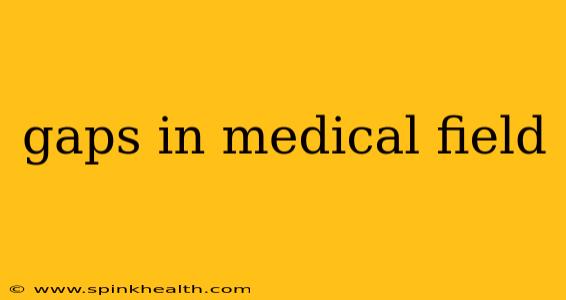The medical field, despite its remarkable advancements, isn't without its shortcomings. It's a complex tapestry woven with threads of innovation and, unfortunately, significant gaps. These gaps aren't merely inconveniences; they represent critical areas needing immediate attention to ensure equitable and effective healthcare for everyone. My journey exploring this topic began with a simple question: where does the system fall short? What I uncovered was a multifaceted problem, far more intricate than I initially imagined.
What are the biggest challenges facing the healthcare system today?
This is a question echoed across countless medical conferences and policy debates. The truth is, there isn't one single "biggest" challenge, but rather a constellation of interconnected issues. We're grappling with a global shortage of healthcare professionals, particularly in underserved areas. Imagine a rural community, miles from the nearest hospital, struggling to access basic care due to a lack of doctors or nurses. This isn't a hypothetical scenario; it's a stark reality for millions worldwide.
Beyond the workforce crisis, we're facing a persistent disparity in healthcare access. Socioeconomic status, race, and geographic location often dictate the quality of care an individual receives. A patient in a wealthy urban center has vastly different options than someone living in a rural, impoverished community. This disparity creates a two-tiered system, where access to cutting-edge treatments and preventative care is unevenly distributed.
What are some of the biggest unmet needs in healthcare?
The unmet needs are plentiful and often intertwined. Consider the burgeoning field of mental health. The stigma surrounding mental illness, coupled with a shortage of mental health professionals, leaves millions without access to vital support. We see a similar story unfold with chronic disease management. While we've made progress in treating many chronic conditions, managing them long-term requires ongoing support and resources that many patients lack.
Another significant unmet need lies in preventative care. Focusing on prevention – through healthy lifestyle promotion and early detection – is crucial for reducing the burden of disease. However, access to preventative services remains inconsistent, particularly for vulnerable populations.
How can we address the shortage of healthcare professionals?
Addressing the professional shortage requires a multi-pronged approach. We need to incentivize young people to pursue careers in healthcare, possibly through scholarships and loan forgiveness programs. Furthermore, streamlining the training and licensing processes can accelerate the entry of qualified professionals into the workforce. Investing in telehealth technologies can also help bridge the gap between healthcare providers and patients in underserved areas.
What are the ethical considerations in healthcare today?
Ethical dilemmas are constantly emerging in the rapidly evolving medical landscape. The cost of new treatments and technologies often presents challenging questions about affordability and access. Advances in genetic testing and personalized medicine raise concerns about privacy and the potential for discrimination. Balancing innovation with ethical considerations is crucial to ensuring a just and equitable healthcare system.
The Path Forward: Bridging the Gaps
The gaps in the medical field are not insurmountable. By acknowledging these challenges, fostering collaboration between healthcare providers, policymakers, and patients, and investing in innovative solutions, we can move towards a more equitable and accessible healthcare system for all. This requires a collective effort—a shared commitment to building a future where healthcare is not a privilege, but a fundamental right. The journey is long and challenging, but the reward—a healthier, more equitable world—is worth the effort.

